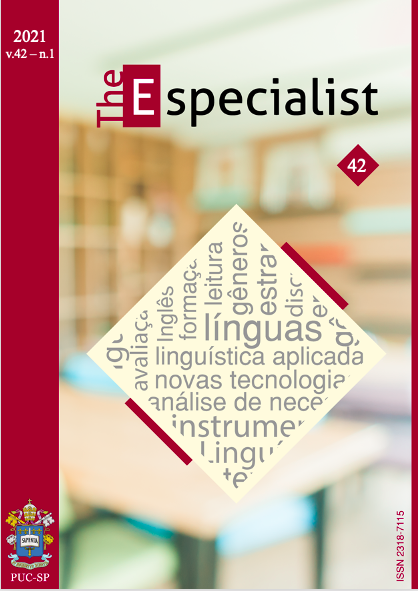Re-pensando jogos: a adaptação e implementação de jogos não pedagógicos para contextos pedagógicos
DOI:
https://doi.org/10.23925/2318-7115.2021v42i1a3Keywords:
Jogo, Jogar, Educacional, Adaptação de Jogo.Abstract
Uma das questões que atualmente giram em torno dos jogos em contextos educacionais, é como eles podem ser incorporados no processo de ensino/aprendizagem. Este artigo apresenta conceitos sobre o que são jogos, discutindo aspectos como suas características em relação ao ato de jogar, conceitos sobre o design de jogos, como suas características intrincadas trazem diferentes experiências para os jogadores, e como esse processo pode contribuir para contextos educacionais. Para tanto, apresentou-se e discutiu-se a utilização de dois jogos sem fins pedagógicos já existentes (o jogo analógico Tong e o jogo digital The Sims) para o contexto de ensino de inglês, tendo o primeiro sua narrativa adaptada para o contexto de compras e o segundo utilizado para a aquisição de vocabulário na língua-alvo, possibilitando experiências significativas para os aprendizes e um recurso alternativo para auxiliar os educadores no processo de ensino-aprendizagem.
References
BOYLE, E. A., HAINEY, T., CONNOLLY, T. M., GRAY, G., EARP, J., OTT, M., PEREIRA, J. 2016. An update to the systematic literature review of empirical evidence of the impacts and outcomes of computer games and serious games. Computers and Education, 94: 178–192. https://doi.org/10.1016/j.compedu.2015.11.003.
CARR, J. M. 2012. Does Math Achievement h’APP’em when iPads and Game-Based Learning are incorporated into Fifth-Grade Mathematics Instruction? Journal of Information Technology Education: Research, 11: 269–286.
CONNOLLY, T. M., BOYLE, E. A., MACARTHUR, E., HAINEY, T., BOYLE, J. M. 2012. A systematic literature review of empirical evidence on computer games and serious games. Computers & Education, 59: 661–686.
COSTA, A. R., FIALHO, V. R., BEVILÁQUA, A. F., LEFFA, V. J. 2012. Contribuindo com o estado da arte sobre Recursos Educacionais Abertos para o ensino e a aprendizagem de línguas no Brasil. Veredas - Revista de Estudos Linguísticos, Belo Horizonte, 20.1: 209-230, jan. /jun.
CRUZ, D. M.; RAMOS, D. (s/d). Games e Formação Docente. Informática na Educação – Série de Livros da CEIE-SBC. (no prelo) disponível em https://ieducacao.ceie-br.org/
GEE, J. P. 2005. Learning by Design: good video games as learning machines. E–Learning and Digital Media, 2.1: 5-16.
GEE, J. P. 2009. Deep learning properties of good digital games: How far can they go? In U. RITTERFELD; CODY, M.; VORDERER, M. Serious Games: Mechanisms and Effects, Routledge Taylor & Francis Group, 67-82
GEE, J. P.; HAYES, E. 2012. Nurturing Affinity Spaces and Game-Based Learning. STEINKUEHLER, C.; SQUIRE, K.; BARAB, S. (Eds.) Games, Learning, and Society: Learning and Meaning in the Digital Age. Cambridge: Cambridge University Press, 129-155.
HUIZINGA, J. 1951. Domo Ludens: essai sur la fonction sociale du jeu. Paris: Gallimard,
JAVERLÄ, S.; EKMAN, I.; KIVIKANGAS, J. M.; RAVAJA, N. 2014.Digital Games as an Experiment Stimulus. Transactions of the Digital Games Research Association (DIGRA), 1.2: 85-115.
KISHIMOTO, T. M. 1994. O jogo e a educação infantil. PERSPECTIVA. Florianópolis, UFSC/CED, NUP, 22: 105-128.
KRONENBERG, F. A. 2012. Selection criteria for commercial-off-the-shelf (COTS) video games for language learning. International Association for Language Learning Technology Journal, 42.2: 52–78.
LORENSET, C. C. 2019. Foreign Language Acquisition and Digital Games Playing: A Focus on Vocabulary Development. Tese de Doutorado. Centro de Comunicação e Expressão. Programa de Pós-Graduação em Inglês, Universidade Federal de Santa Catarina.
LORENSET, C.C; TUMOLO, C. H. S. 2019. Vocabulary Acquisition in English as a Foreign Language: Digital Gameplaying The Sims. Revista Linguagem & Ensino, 22.4: 1002-1019. Pelotas.
PRENSKY, M. 2001. Digital Natives, Digital Immigrants Part 1. On the Horizon, 9.5: 1-6.
SCHELL, J. 2008. The Art of Game Design: A Book of Lenses. Elsevier Morgan Kaufman Publishers, 2008.
SCHUYTEMA, P. 2008. Design de Games: Uma Abordagem Prática. 1ª ed. Cengage Learning.
SENA, S. de; CATAPAN, A. H. 2016. Metodologias para a criação de jogos educativos: uma revisão sistemática da literatura. Novas Tecnologias na Educação, 14.2: 1-11.
SØRENSEN, B. H.; MEYER, B. 2007. Serious games in language learning and teaching: A theoretical perspective. Proceedings of the 2007 Digital Games Research Association, 559–566. Retrieved from http://www.digra.org/dl/db/07312.23426.pdf. 2007.
SYKES, J. M. 2013. “Just” Playing Games? A Look at the Use of Digital Games for Language Learning. The Language Educator. October Special Issue on Technology, 32-35.
TAVARES, R. 2009. Fundamentos de Game Design para Educadores e Não Especialistas. In: L. SANTAELL; M. FEITOSA (Orgs.). Mapa do Jogo: A Diversidade Cultural dos Games. São Paulo: Cengage Lerning, 239-249.
VAN ECK, R. N. 2015. Digital game-based learning: still restless after all these years. Educause Review, 50.6: 13-28.
ZAGAL, J. P. 2008. A Framework for Games Literacy and Understanding Games. Proceedings of the 2008 Conference on Future Play: Research, Play, Share, 2008.
Downloads
Published
How to Cite
Issue
Section
License
The authors grant the journal all copyrights relating to the published works. The concepts issued in signed articles are the absolute and exclusive responsibility of their authors.


 Esta obra está licenciada com uma Licença
Esta obra está licenciada com uma Licença 